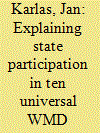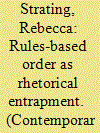|
|
|
Sort Order |
|
|
|
Items / Page
|
|
|
|
|
|
|
| Srl | Item |
| 1 |
ID:
192522


|
|
|
|
|
| Summary/Abstract |
Zero-day vulnerabilities are software and hardware flaws that are unknown to computer vendors. As powerful means of carrying out cyber intrusions, such vulnerabilities present a dilemma for governments. Actors that develop or procure such vulnerabilities may retain them for future use; alternatively, agencies possessing such vulnerabilities may disclose the flaws to affected vendors so they can be patched, thereby denying vulnerabilities not only to adversaries but also themselves. Previous research has explored the ethics and implications of this dilemma, but no study has investigated public opinion regarding zero-day exploits. We present results from a survey experiment testing whether conditions identified as important in the literature influence respondents’ support for disclosing or stockpiling zero-day vulnerabilities. Our results show that respondents overwhelmingly support disclosure, a conclusion only weakly affected by the likelihood that an adversary will independently discover the vulnerability. Our findings suggest a gap between public preferences and current U.S. policy.
|
|
|
|
|
|
|
|
|
|
|
|
|
|
|
|
| 2 |
ID:
192519


|
|
|
|
|
| Summary/Abstract |
States conduct unclaimed coercive acts, imposing costs on adversaries to signal resolve but denying (or not claiming) responsibility. Some scholars posit that unclaimed acts have considerable potential to coerce targets, while containing escalation risks. Others suggest that unclaimed coercive efforts tend to fail and trigger escalation. We assess these competing perspectives about the effects of unclaimed attacks with a vignette experiment exposing US-based respondents to a scenario where, after Russia warns of unpredictable consequences if NATO continues providing weapons to Ukraine, an explosion occurs at a NATO base in Poland used to funnel weapons to Ukraine. Intelligence agencies and independent analysts identify Russia as the likely culprit, while not ruling out the possibility of an accident. We randomize whether Russia claimed or denied responsibility for the explosion and find that unclaimed acts have lower coercive leverage than claimed ones, but the two do not significantly differ in escalation risk.
|
|
|
|
|
|
|
|
|
|
|
|
|
|
|
|
| 3 |
ID:
192521


|
|
|
|
|
| Summary/Abstract |
Much of what we know about state participation in universal weapons of mass destruction (WMD) treaties is based on research about the Nuclear Non-Proliferation Treaty (NPT). This article instead analyzes the ratification of all ten current WMD treaties. Using a survival analysis of ratification events (1960–2022), it challenges conventional wisdom. It shows that security threats—a factor stressed by neorealists and research on the NPT—provide only a weak and incomplete explanation. Instead, three types of costs and benefits influence ratification decisions: policy change costs, benefits from the secondary functions of treaties, and benefits from the conformity with the ratification behavior of regional peers. More specifically, the article finds that the possession and pursuit of WMD delays ratification. The country’s support for the liberal hegemonic order, the level of its economic development, and a high regional ratification rate of the respective treaty increase the probability of ratification.
|
|
|
|
|
|
|
|
|
|
|
|
|
|
|
|
| 4 |
ID:
192523


|
|
|
|
|
| Summary/Abstract |
Some Arab countries have since 2011 experienced intense security market diversification with considerable outsourcing of domestic security and guarding services. To date, scholars and security experts predominantly conceive this development within security reform processes or as an inevitable outcome of a chaotic post-uprisings period. Instead, this article situates some Arab states’ increasing reliance on private security actors within the evolving power dynamics and diverse challenges facing ruling elites and populations alike. Addressing how privatizing security contributes to perpetuating authoritarian practices post-2010, the article argues that contemporary security privatization and outsourcing provide alternative agents and strategies for control, while offering new venues to enrich and strengthen ruling elites. Guided by critical security studies and drawing on interviews, fieldwork and official documents, the article advances three ways through which outsourcing security supports practices of authoritarian adaptation: cultivating networks of patronage, diversifying ruling elites’ bases of security, and curbing constant sources of unrest.
|
|
|
|
|
|
|
|
|
|
|
|
|
|
|
|
| 5 |
ID:
192520


|
|
|
|
|
| Summary/Abstract |
In response to challenges to Asia’s security order, regional powers such Australia, India, and Japan have adopted new “Indo-Pacific” strategic narratives to promote and defend the “rules-based order.” These narratives use China’s maritime disputes with smaller neighbors in the South China Sea as a key example of Beijing’s revisionist intentions. Yet such narratives expose “rules-based order” advocates to risks of “rhetorical entrapment” as other actors compel them to abide by the standards they have set. To what extent have Indo-Pacific powers been forced to follow the rules in their own asymmetrical maritime disputes? This article examines three Indo-Pacific cases: Timor Sea Compulsory Conciliation between Australia and Timor-Leste, the Chagos Island Marine Protected Area Arbitration between the United Kingdom and Mauritius, and the Bay of Bengal Maritime Boundary Arbitration between India and Bangladesh. To varying degrees, this article finds that strategic narratives constrained the policy options of all three Indo-Pacific powers.
|
|
|
|
|
|
|
|
|
|
|
|
|
|
|
|
|
|
|
|
|